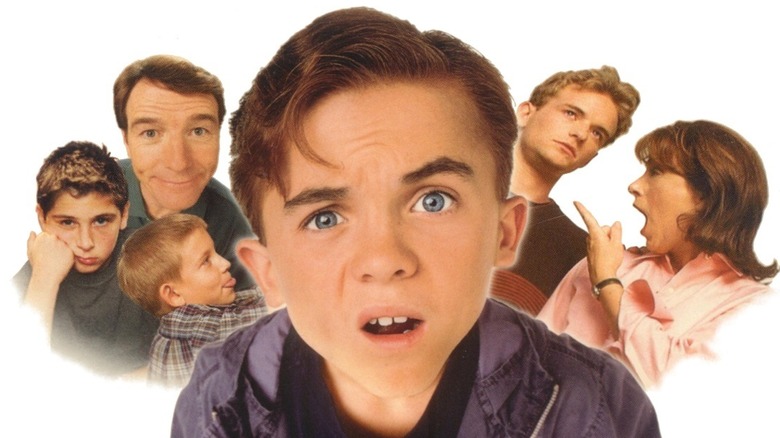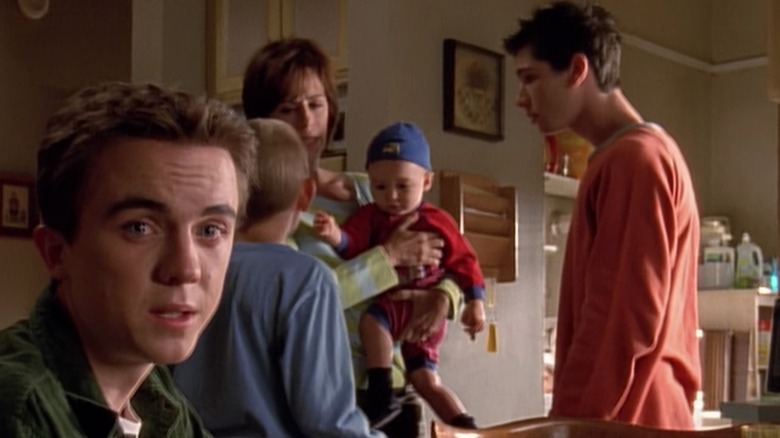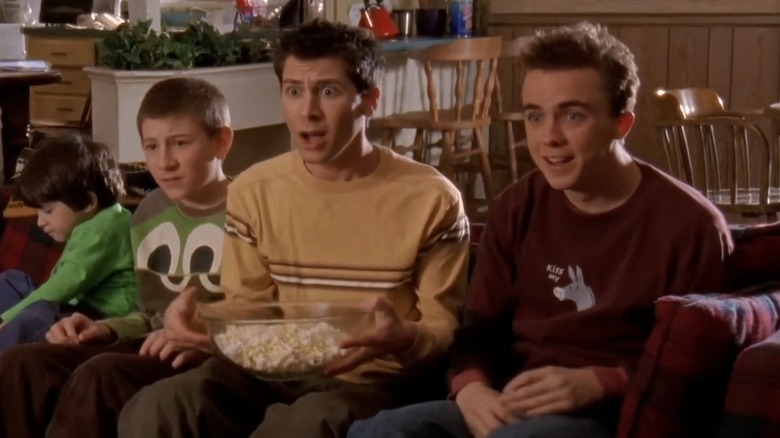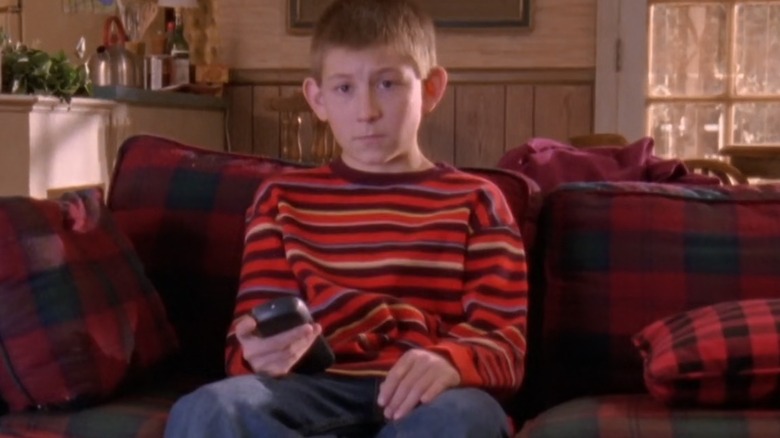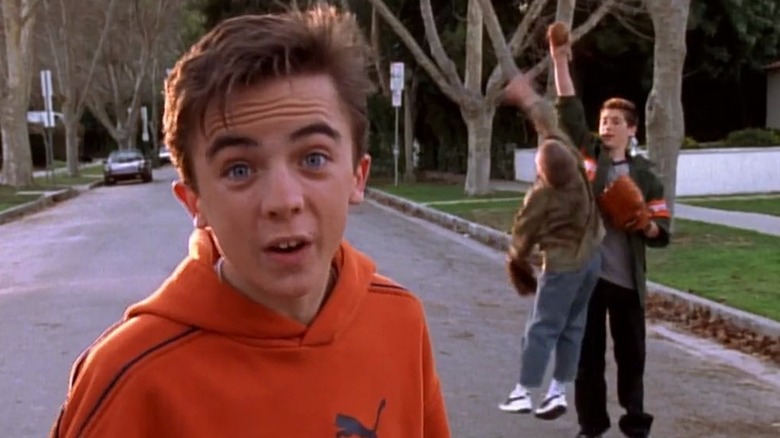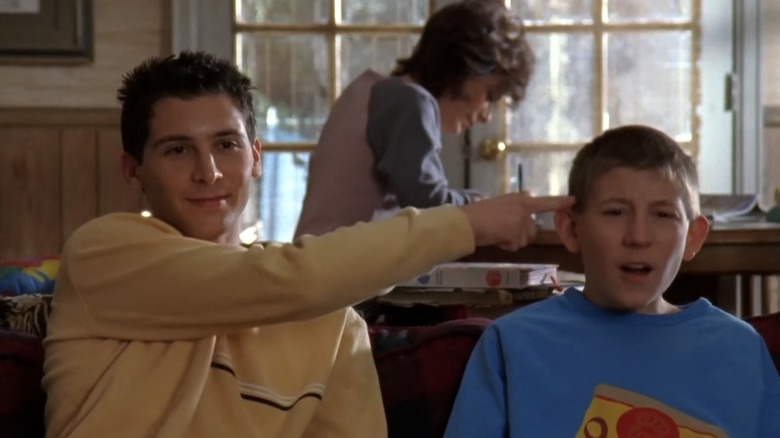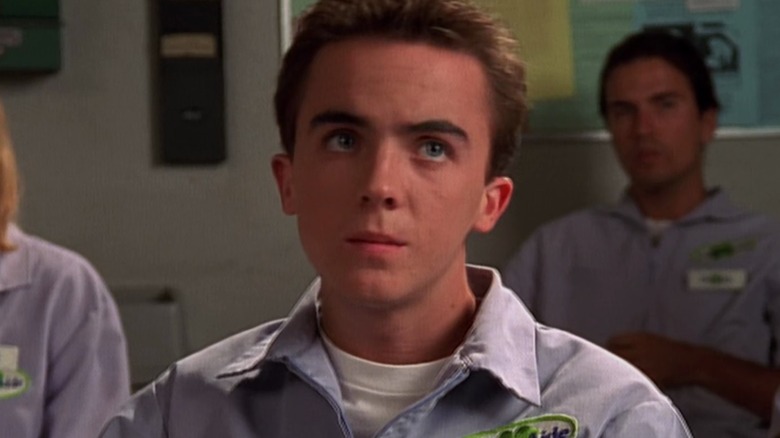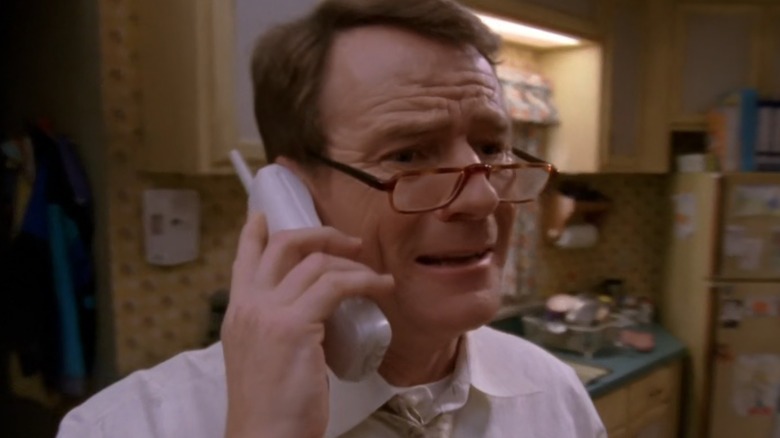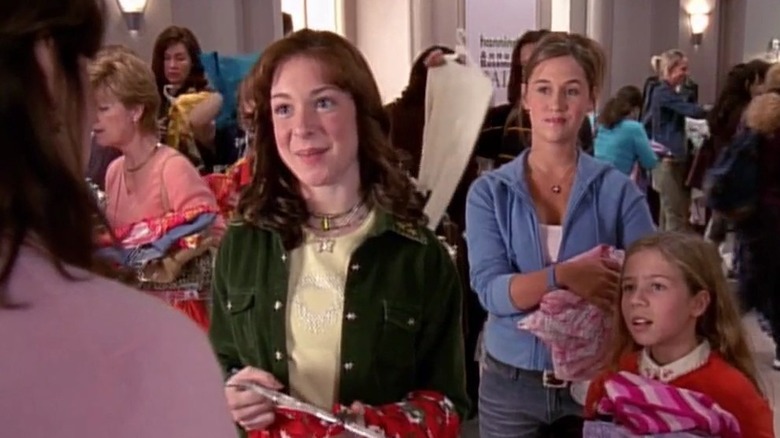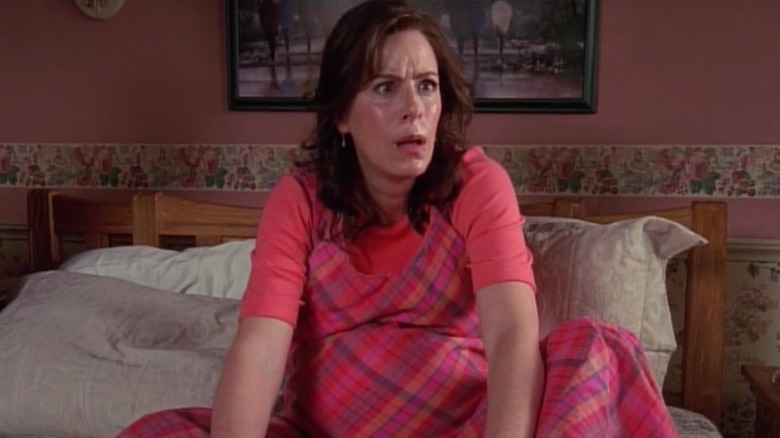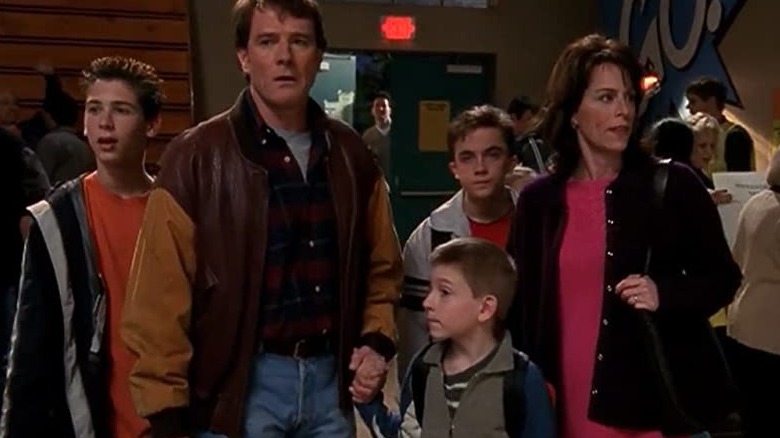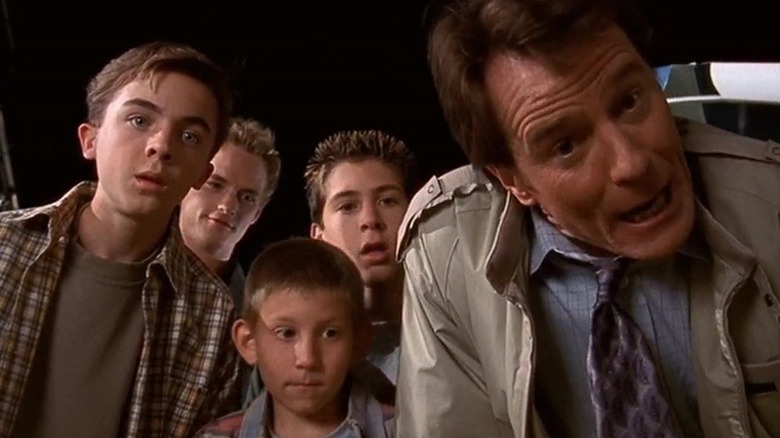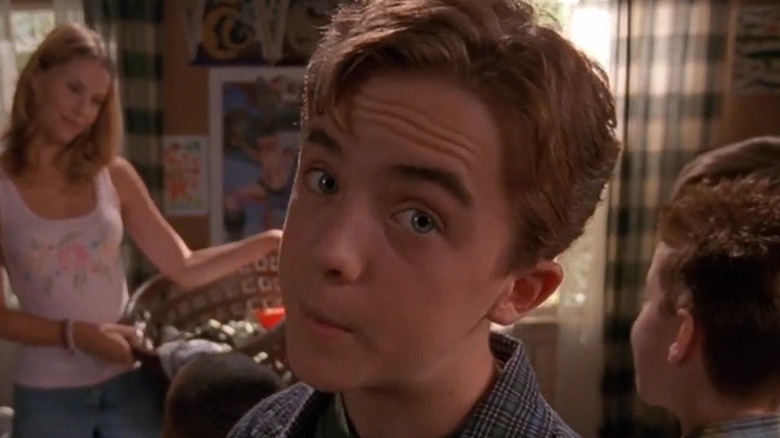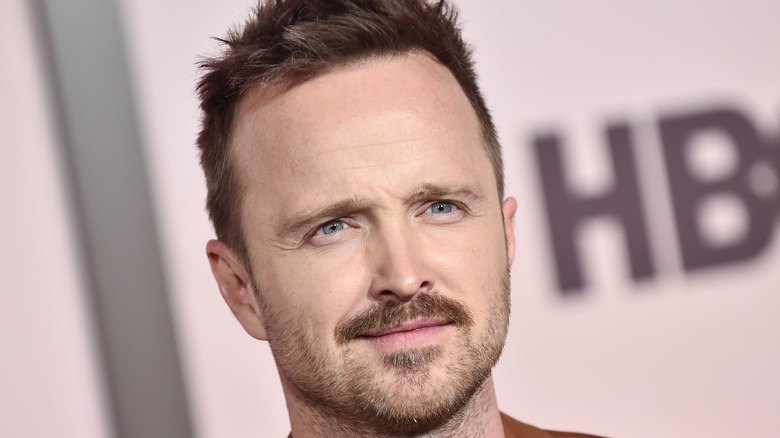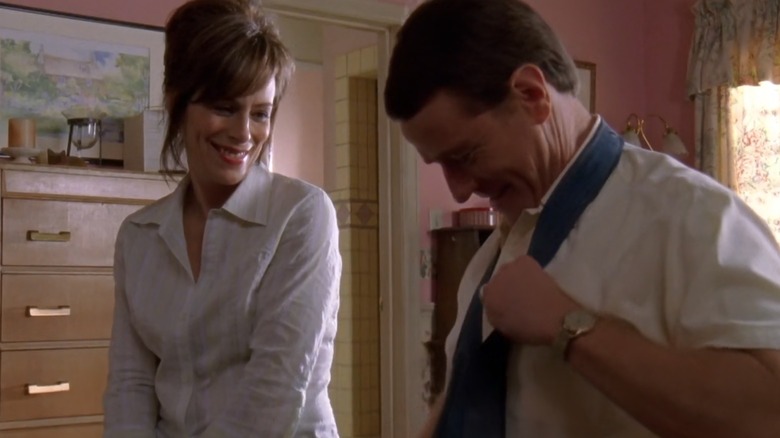The Untold Truth Of Malcolm In The Middle
Without a doubt, there is a clear dividing line in the world of sitcoms between the years preceding and after "Malcolm in the Middle." A modern TV fan's first look at a '90s family sitcom would make such shows feel very old. This is all because "Malcolm in the Middle" was a significant watershed moment in American television.
According to Tilt Magazine, every studio, producer, and network believed the program would be a flop when it was first conceived. And this wasn't simply because studios were cynical and mean-spirited; the popular sitcoms during the 1990s had a mutual cohesiveness that appealed to both fans and critics. No one anticipated "Malcolm in the Middle" would succeed when it debuted at the turn of the new millennium, ready to shatter virtually every convention. Nobody but a small group of Fox executives were committed to getting the show on the air and making it a success.
The idea behind the show is almost as interesting as the actual show, which is typical for classics. So let's take a deep dive into what motivated the show's conception, all the minor building elements that led to the show's unique style, and all the credited and uncredited influence it left. Here is the untold truth of "Malcolm in the Middle."
The creator based the show on his own life
Linwood Boomer, the show's creator, began his acting career in minor roles on shows such as "Fantasy Island," "The Young and the Restless," and eventually "Little House on the Prairie," where he later had a more significant role. But it was his writing skills that provided him with his big break, catapulting him quickly up the Hollywood ladder when he eventually penned a pilot about what he described to The New York Times as "an extreme version of a family." But it wasn't just any family; it was his family. In the same interview, he went into further detail about his youth.
Boomer grew up in a working-class Californian family with four brothers and a strict mother. These were obvious building blocks for the show. "It's a gigantically exaggerated and self-serving version of my life and childhood," Boomer further remarked of the series. The executives who championed it were driven by this extremely grounded approach. They noted that, while the program did not reflect the style of the era, it did reflect society in how families can frequently find humor and harmony within dysfunction. Although the admonition to "write what you know" may be progressively losing relevance for aspiring authors, "Malcolm in the Middle" proves that it's pretty difficult to make a mistake when that principle serves as your compass.
It was an instant hit for the network
Prior to "Malcolm in the Middle," the two most popular series on its home network Fox were "The X-Files" and "The Simpsons." To be fair, those were iconic series in their own right, but, according to Variety, Fox hadn't had a genuine live-action comedy smash since "In Living Color." Before "Malcolm in the Middle," Fox tried its hand at a dark comedy about Hollywood society called "Action," which was critically successful but never really attracted large audiences. Fortunately, "Malcolm in the Middle" had the network's full backing, and they made sure that it was well advertised and aired at a strategic timeslot, during a season where competition was limited.
All of this paid off; not only was "Malcolm in the Middle" the best Fox debut since "The Simpsons," but Variety also reported that it was the number one show targeting its primary demographic of teens. This was unprecedented for a network that had been struggling for nearly a decade to create a live-action hit, and it was even more surprising that they managed to pull it off without any stars and through such a subversive show. The triumph, however, did not stop with the audience: The pilot episode of the show also won two Emmy awards.
It had to move networks initially
"Malcolm in the Middle" was at another network before it found a home at Fox. "UPN bought it," Linwood Boomer told TV Guide. "It was over there about four months." They ultimately opted against it since "Malcolm in the Middle" did not fit in with the network's other programs at the time, which mainly were comedies aimed at a more mature demographic. Despite this, all credit goes to UPN for allowing the show to relocate to another network without hassle.
Gail Berman reportedly fought for the show's potential when it was stuck in development hell. She was a firm believer because, as she later told The New York Times, "To have a writer's singular vision is everything." Berman continued: "The family in the show struck a chord among viewers who seem to identify with it. Everything isn't tied into a neat bow. But they're doing their best. They're working hard. And the parents love each other and love their children. It's a pretty accurate description of many families.”
Doug Herzog was in charge at Fox at the time, and it just so happened that Berman had what he was searching for — in fact, the pilot's script made him think of his own family. As a result, Fox took over the show and gave Boomer complete creative control.
The look of the show differed greatly from sitcoms of the time
Boomer's choice to modify the show's look was one of the most significant ways he exercised this creative freedom. Most networks used a live studio audience, a multi-camera setup, and a noticeable laugh track when "Malcolm in the Middle" initially aired. This worked well for sitcoms like "Friends" and "Everybody Loves Raymond," but Boomer wanted something different. He wanted a show shot on location with a single camera to give it a cinematic feel, and Malcolm broke the fourth wall and addressed the audience frequently. The icing on the cake, though, was that the series would not use a laugh track in any way.
Although all of these changes are now relatively standard, with "Modern Family" and "Abbot Elementary" taking this approach even further with the introduction of mockumentaries, "Malcolm in the Middle" was genuinely pioneering for its time. In a Knight Riddler piece regarding the status of comedy at the time, Boomer's peers were full of compliments for him, with Drake Sather summarizing the broader feeling. "I think it's great they're dropping the laugh tracks," he said. "You gotta trust the audience to be a little sharper."
To this day, the death of laugh tracks is still discussed among TV fans. Although it's difficult to say for sure whether it was ultimately a good thing, "Malcolm in the Middle" remains ingrained in that conversation and the role it played in ensuring that.
The opening theme song Boss of Me won a Grammy
The radio was the home of serialized storytelling before the advent of television. Audiences would gather around at specified time slots to hear their favorite storyteller deliver the newest episode of their favorite program. However, before the broadcast began, there was always a memorable tune to inform the audience that the moment they had all been waiting for had arrived. Serialized storytelling was adapted for television as it began to develop into what it is today, and the addition of images forced many changes. But one element remained constant: The music at the program's start.
This stresses how vital theme music for television programs has always been. The song must express the show's spirit in around 30 seconds, whether a well-known existing hit or one written just for that production. "Malcolm in the Middle" was in the latter category. They Might Be Giants' song "Boss of Me," which serves as the show's theme, has become synonymous with the program. With the blaring bass, the aggressive lyrics, and the overarching theme that life is unfair, it's really no surprise that the song became one of the band's highest charting singles. The Grammy-winning song was named one of Billboard's top songs about siblings
The writers wanted the family's name to remain a mystery
Family sitcoms are designed to offer viewers a nice sense of relatability, as if they were watching their own family or a family in their neighborhood. That's why, when we think of family sitcoms, we automatically think of the Goldbergs, the Simpsons, or even the Johnsons. These tropes appear to remind people of a more structured and safe time in their own childhoods. For this reason, the term "America's Dad" became popular, because viewers saw and wanted a trustworthy and consistent depiction of a parent to aspire to. This approach to making sitcoms always worked.
But, as we've previously established, Linwood Boomer never had any interest in fitting in. He wanted to show what it was like growing up in his family. It was a little more chaotic than what was available on television, so he changed things up once again to further distinguish the show from what was already offered. Boomer made the decision to withhold the family's name. The absence of a family name intrigued the press, and they kept writing about it, giving the show even more coverage in the run up to the premiere. Boomer's bet was proved correct yet again. The name was revealed as The Wilkersons with little fanfare — via "an errant name tag in the pilot," Today noted.
Bryan Cranston's impressive audition made the creator laugh off his chair
Linwood Boomer has admitted that his original version of "Malcolm in the Middle" patriarch Hal was nowhere near as layered on the page as he ended up being on the screen. "I imagined him as just remote, distant," Boomer said to GQ. "It was a writer's conceit that just lay there on the page like a turd." Everything changed, however, when Bryan Cranston arrived for his audition.
The show was intended to focus on the boys' relationship with their mother, with the father playing more of a bit part. So when they eventually saw Cranston for his audition, he discovered that his character had been such an afterthought that the audition had no lines and was taking place on a set under construction. Cranston took it all in stride, though, and managed to not only blow Boomer's mind with how he embraced the character but also make Boomer laugh so hard that he literally fell off his chair.
This inspired the producers to make Hal a more vital part of the family, and he always had his own narrative that contributed to the family dynamic. In fact, some of the series' finest episodes are Hal-centric, with Season 2's penultimate episode "Evacuation" being a standout.
One of the episodes was written by an 11-year-old
"Malcolm in the Middle" was always about how the boys perceived their mother. There were times when they despised her toughness, others when they dreaded it, and still others when they respected it. However, the show would occasionally give us Lois' (Jane Kaczmarek) point of view and show us her wants and desires. It made the show more endearing, since each character seemed authentic. One such Lois-centered episode, believe it or not, was the idea of an 11-year-old girl.
In the episode "If Boys Were Girls," Lois takes her boys to the mall to buy new clothes, and they are, predictably, disgruntled. So they begin grumbling in the backseat of the car, causing a commotion, and this is when Lois begins fantasizing about them as girls rather than boys. According to Entertainment Weekly, Alexandra Kaczenski came up with the episode's concept. She was usually on set with her aunt, Heidi Kaczenski, the show's costume designer, and that familiarity gave her the guts to pitch the concept for the episode to Linwood Boomer.
Alexandra Kaczenski, to her credit, didn't just pitch the episode and walk away; she went ahead and created a two-page outline for the episode and ended up with a "story by" credit. To add to her luck, the episode went on to win an Emmy for outstanding editing.
Jane Kaczmarek's pregnancy was written into the storyline
While the show was still on the air, Jane Kaczmarek was in a high-profile relationship with "West Wing" star Bradley Whitford. The two were on the biggest shows of the day and were also nominated for Emmys year after year. So when the two were reported to be expecting a child, it became celebrity news. Although the New York Post attempted to obtain an official statement from Fox on how the pregnancy would affect the show, Fox chose to remain silent. However, it was ultimately revealed that "Malcolm in the Middle" intended to incorporate her pregnancy into the series, thanks to none other than Jane Kaczmarek herself.
The secrecy didn't stop there; when Jamie joined the boys in the fifth season as their new sibling, it was never clear whether he was a boy or a girl, with Jamie being a gender-neutral name for the most part. After a few episodes, the writers decided not to change the dynamic of the boys' connection with their mother too much and settled the mystery of his gender. Incidentally, Jamie ended up providing the series new life by being a focal point as the other boys grew older and the comedic antics had to evolve.
The creator stepped down from his role as showrunner in the final season
As the sixth season came to a close, it was evident that "Malcolm in the Middle" was beginning to decline. The entire television landscape had changed, and the primary audience had grown up, which may have resulted in shifting tastes. Fox decided to sever ties with "Malcolm in the Middle" and declare that the seventh season would be the final one. By this point, Boomer's main supporters had either left the network or were on their way out, so he decided to do the same: Boomer stepped down as showrunner of "Malcolm in the Middle" ahead of the final season. He did, however, remain on as a consultant and directed a few episodes, including the series finale.
This is not to argue that the program's overall quality decreased as fewer people watched it; in fact, some of the finest episodes are found in the latter seasons and are more enjoyable to watch again. Fortunately, the aforementioned finale ended up bringing back many fans who had left the show somewhere along the way, and they were not disappointed. Even today, the finale holds up quite well.
There have been conversations about a Malcolm in the Middle movie
Bryan Cranston became a huge star thanks to the success of "Breaking Bad," which was great for him, but it left fans of "Malcolm in the Middle" believing that the chances of him reprising the role of Hal were now slim to none. Thankfully, that's not the case — there's been talk of the "Malcolm in the Middle" cast reuniting for a movie. Whether or not that happens will likely be determined by how well "Malcolm in the Middle" performs on streaming services.
Cranston, for his part, has revealed that he would be thrilled to return and reprise the role because he is still so close to his former castmates. "There has been some conversation about that," he said when asked about a "Malcolm in the Middle" film during a Reddit AMA. "I don't know if or when that could happen, I guess we have to gauge the temperament of the fans to see if it's something they want."
Frankie Muniz doesn't remember much about the show
Starring in a TV show is the dream of every young actor. Sadly, "Malcolm in the Middle" lead Frankie Muniz doesn't remember much from his time on the show. While appearing on "Dancing with the Stars" in 2017, Muniz revealed that a series of concussions have severely affected his ability to remember those precious years of his childhood. "The truth is, I don't really remember much of that," Muniz said on the show (via Time magazine). "It makes me a little sad." His onscreen father Bryan Cranston goes out of his way to remind the actor-turned-TV host about all the good times they had making the iconic sitcom. "My job is to tell him to remember what happened on 'Malcolm in the Middle,'" Cranston said.
Muniz later clarified on a podcast that he hasn't lost his memory altogether, it's just very patchy. "It's interesting, I've thought about it a lot over my years, like, 'Why do I have a bad memory?'" Muniz said on "Steve-O's Wild Ride!" (via Entertainment Tonight). "The only logical thing I can say is, 'Yeah, I've had nine concussions.' When I was a kid playing basketball and I'd get tripped. I played football. Just doing life things, sports. There were some in racing accidents." He went on to say that the fact he did so much in such a short space of time doesn't help matters. "A lot of my memories now are that I can't distinguish if it were a dream or if it was reality."
Aaron Paul wanted to play Francis in the show
Aaron Paul is best known for starring opposite Bryan Cranston in "Breaking Bad," but it turns out the two actors could have been on the same show a lot earlier. During a Reddit AMA, Paul — who has been widely praised for his turn as Jesse Pinkman on the hit AMC show — revealed that he wanted to play Francis in "Malcolm in the Middle." "The funny thing about that is a lot of people thought I auditioned for Francis but in reality they never would see me," he said. "I read the pilot of 'Malcolm in the Middle' because it was sent to me and I desperately wanted to audition but they kept passing me."
The actor also said that being knocked back for the part of Francis ultimately worked out for the best. He said that he "definitely wouldn't have gotten the role of Jesse Pinkman on 'Breaking Bad'" if he was known for "Malcolm in the Middle," though it didn't seem to hold Bryan Crantson back. "When I was auditioning for BB, I knew they were getting the goofy dad from 'Malcolm in the Middle' to play Walter White, which confused me," Paul revealed. "But I was also very excited at the chance to work with Bryan."
Breaking Bad was all in Hal's head according to an alternate ending
Wouldn't it have been funny if "Breaking Bad" ended with Hal from "Malcolm in the Middle" waking up and realizing that it was all a terrible dream? It's a question that Bryan Cranston asked on the set of the hit AMC show, so he and the powers that be decided to make it a reality. The wacky alternate ending sees Cranston waking up in bed and turning to tell his wife all about it — then we see that it's not Anna Gunn's Skylar, but Jane Kaczmarek's Lois.
The hilarious scene was penned by "Breaking Bad" writing assistant Gordon Smith, who took inspiration from the infamous fake out ending of the show "Newhart." The finale of that show reveals that it all took place in the head of the main character. When star Bob Newhart wakes up, he's back in the role of psychologist Dr. Bob Hartley, who he played years earlier.
